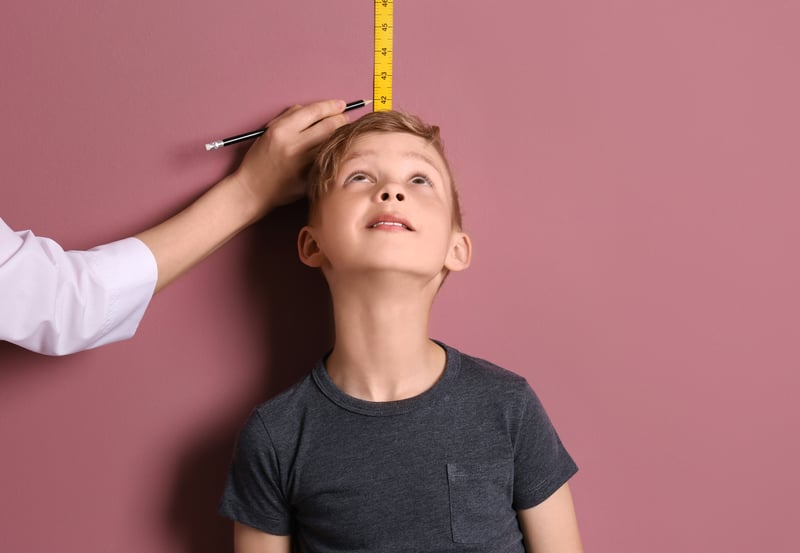Get Healthy!

- Sarah D. Collins
- Posted July 7, 2023
Do Short Kids Need Growth Hormone to Boost Self-Esteem? Maybe Not
Pediatric endocrinologist Dr. Erin Okawa works in a wealthy Los Angeles neighborhood and sees many parents worried about their kids' height.
"I have a clinic in Manhattan Beach, which was apparently settled by ex-volleyball players and ex-soccer players,"she said. "So there are a lot of very tall parents in Manhattan Beach. And I have referral after referral, I see kid after kid there for short stature concerns."
When speaking with these prospective patients' parents, Okawa likes to remind them that even if their child seems short in their above-average-height neck of the woods, if they traveled just 30 minutes east to other parts of L.A. such as South Pasadena, Artesia or San Marino, their son or daughter might even have above-average stature compared to the general population.
While some kids with hormone deficiencies might have a genuine medical need for pediatric growth hormone (GH), Okawa welcomes additional evidence from a new study that says using GH for cosmetic purposes might not greatly impact a child's socialization.
The study -- recently published in the Journal of Pediatrics -- shows that in healthy, shorter kids, quality of life is better measured by how well-supported they feel over their height.
For the study, researchers interviewed 60 parent-child pairs who were scheduled for GH testing. The 8- to 14-year-olds' self-esteem, coping skills, social support networks and parental support were assessed.
Researchers found that perceived support from friends and classmates was the best indicator of how parents and kids viewed their self-esteem and quality of life. Interestingly, they also found that shorter kids with taller parents reported higher self-esteem.
As next steps, the team will continue monitoring the kids to assess their self-worth over time.
"What really inspired this study was when patients come in and you ask, 'Why are you here?' Sometimes families would come in and they'd be like, 'I don't know. I'm short, I'm fine. My spouse is short. They're fine. Of course, our kid is short. What did the pediatrician expect?'" said senior author Dr. Adda Grimberg, director of the Growth Center at Children's Hospital of Philadelphia.
"And then at the same time there'd be other families coming in who would say, 'My kid's short, life is gonna be terrible. They're not going to be taken seriously at work. They won't be able to find a date or a spouse," she said. "But yet in [the latter] families, those kids are actually growing taller than the kids whose families are saying it was fine. So to me, that was kind of a clue that maybe it's not the height."
Both Grimberg and Okawa suspect preconceived notions about favorable traits in factors like gender and race are likely at play.
"I'm half Japanese. My background is in a population where the average height for me I think is like 5-foot-5 or something,"said Okawa, who was not part of the new study. "So for me height has never been a big deal. But I think in America, there is this notion in society that taller is better."
And among those seeking GH, white and wealthier families seem to be particularly concerned.
"It's been documented, honestly, since the advent of recombinant growth hormone in 1985, that we tend to see more white families from higher socioeconomic status coming in for evaluation and for growth hormone,"Grimberg said.
The topic of sports often comes up as well, Okawa said.
"A lot of these parents were athletes and their kids play seven different sports,"she said. "And they feel that if the kids were taller, they'd be stronger, faster, more athletic, better. And I do try to counsel them that athletic prowess is also not everything. We should try to raise a well-rounded child that doesn't need to rely on sports for self-confidence."
Okawa said it's also important to keep in mind that GH, like any medication, has risks and side effects, and it requires a daily injection for kids who opt to receive it.
It's true that Western society does seem to put a premium on tall individuals, especially in men. Studies have found that they tend to be wealthier and more successful.
Fortunately for children who feel like they've received the short end of the stick on, well, height, and who don't have access to or don't want to use GH, the narrative does seem to be shifting.
Trendy terms like "short king"are increasingly scrawled next to stars' names like Spider-Man's Tom Holland, who stands around 5-foot-8.
"I think it's great that there are more role models out there for children that are not, you know, 6 feet tall,"Okawa said. "I also think it's easier to know the heights of the people you're seeing on TV now versus like 20 years ago, when no one knew how tall Tom Cruise was, and he's like 5-foot-5. So I hope that the tides are turning."
More information
Cedars-Sinai has more on growth hormone deficiency in children.
SOURCES: Erin Okawa, MD, pediatric endocrinologist, UCLA Health/David Geffen School of Medicine, Los Angeles; Adda Grimberg, MD, professor, pediatrics, Perelman School of Medicine, University of Pennsylvania, and scientific director, Diagnostic and Research Growth Center Children's Hospital of Philadelphia; Journal of Pediatrics, May 10, 2023, online







